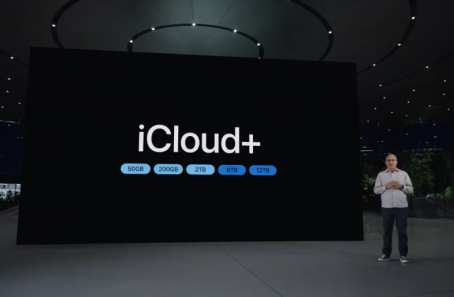A consumer rights group in the UK called “Which?” is suing Apple under competition law on behalf of the 40 million or so people who use its cloud storage service, iCloud.
As of right now, the collective proceeding lawsuit is asking for £3 billion in damages, which is about $3.8 billion. It says that Apple has broken competition rules by giving its own cloud storage service special treatment and making people pay “rip-off” prices for iCloud.
‘iOS has a stronghold and controls all of Apple’s operating systems. Apple should not abuse this power to get an unfair edge in related markets, such as the cloud storage market. Which said in a press release that they were making the claim with the U.K.’s Competition Appeal Tribunal (CAT) that “that is exactly what the case is.”
The lawsuit says that Apple makes it hard for people to use other storage providers by not letting them store or back up all of their phone’s data with a third-party provider and encouraging people who use its products to sign up for iCloud for photo storage and other data storage needs.
unch”iOS users will have to pay for the service after 5GB of free photos, notes, messages, and other data are used up,” Which said.
They also say that Apple overcharges people in the UK for iCloud services because there isn’t much competition. “Apple raised the price of iCloud for UK consumers by between 20% and 29% across all of its storage tiers in 2023,” it wrote. It also said that it was suing Apple to get money back from all of its customers who were affected. Each customer could be owed an average of £70 (about $90), depending on how long they’ve been paying Apple for iCloud services.
In the U.S., a similar lawsuit was made in March, saying that Apple illegally monopolised the market for cloud storage. The case is still going on because Apple failed to get it thrown out.
Apple sent a statement in response to the suit in the U.K. In it, the company said, “Apple believes in giving our customers options.” ” Our users don’t have to use iCloud, and a lot of them store their info on a variety of third-party services instead. We also do our best to make it as easy as possible to move info, whether it’s to iCloud or another service. We don’t agree with the idea that the way we run iCloud hurts competition, and we will fight any court claim that says otherwise.
Apple says that the price of iCloud is about the same as other cloud storage services. A lot of Apple customers use other storage choices, too. The company says that almost half of its customers don’t pay for iCloud+ because they don’t need the extra space or don’t want to use the paid service.
People In The U.K. Chose To Join
People in the U.K. who are qualified to be included can choose not to be included in the U.K. claim. People who don’t live in the U.K. but think they should be included must choose to be a part of the action.
Tom Handley, a spokeswoman for Which, told us that eligible Apple customers are “anyone who has ‘obtained’ iCloud services, including non-paying users, over the nine years since October 1, 2015, when the Consumer Rights Act went into effect.”
Handley also stated that the £3 billion compensation amount takes into account possible opt-outs, duplicates, and death.
In this case, the lawsuit is being paid for by Litigation Capital Management (LCM), a big global litigation funder that has promised to see the case through to the end.
Which is also asking Apple to settle the claim without going to court by giving customers their money back and making iOS more open so users have “a real choice” of cloud services.
Anabel Hoult, the CEO of Which, said in a statement, “By bringing this claim, Which? is showing big companies like Apple that they can’t rip off UK consumers without facing consequences.” By going to court, we can help customers get the money they’re owed, stop people from acting in the same way again, and make the market better and more competitive.
In the event that Apple doesn’t try to settle out of court, the next step in the case will depend on whether the CAT lets Which represent all customers as a group and lets the claim go forward as a whole.
In the past few years, there have been more competition suits in the way of class actions against Big Tech. This is because of a wave of antitrust enforcements on both sides of the Atlantic that is still having an effect on businesses.
Over in the U.K., developers have also sued Apple in a class-action style for unfair competition over App Store fees, which happened last year.
Also Read: Apple Changes Its App Store Rules to Let Old Game Emulators Work Everywhere
Another suit from the U.K. last year also went after Apple and Amazon, saying they worked together to set prices.
What do you say about this story? Visit Parhlo World For more.


